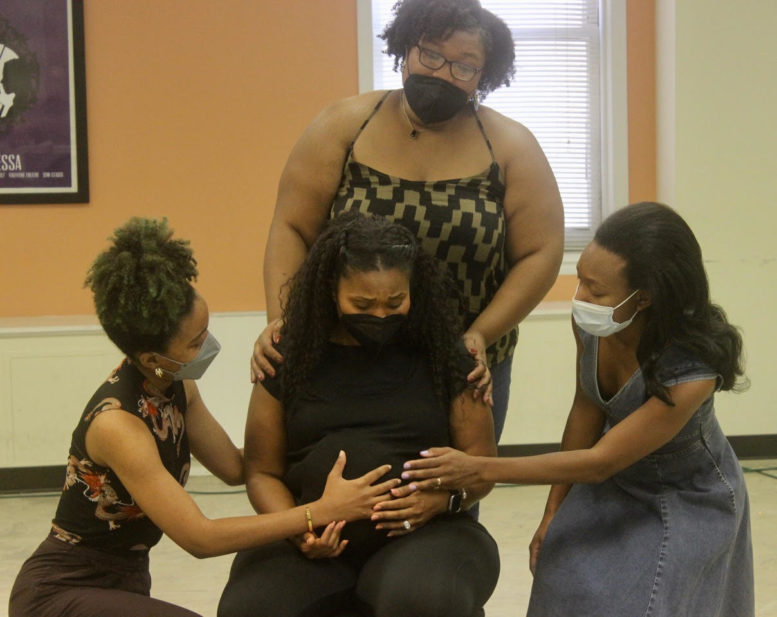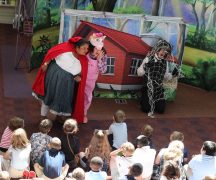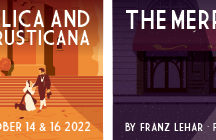By DAVID DUPONT
BG Independent News
When the character, simply called The Mother, announces to her girlfriends that she is having a baby, they are excited.
When she tells them the child is a boy, a shadow descends on the celebration. A Black boy born into a racist world is a tragedy in the making.
But The Mother, performed by Aundi Marie Moore, is undeterred in her joy at the impending birth.
The story of The Son (Darius Gillard) and his family unfolds in the opera “Blue.” The award-winning opera written and directed by Tazewell Thompson with music by Jeanine Tesori will be staged by the Toledo Opera Friday, Aug. 26, at 7:30 p.m. and Sunday, Aug. 28, at 2 p.m., in the Valentine Theatre, 400 N. Superior St., Toledo. For tickets, visit: toledoopera.org
[RELATED: Toledo Opera tackles issue of race & police in ‘Blue’]
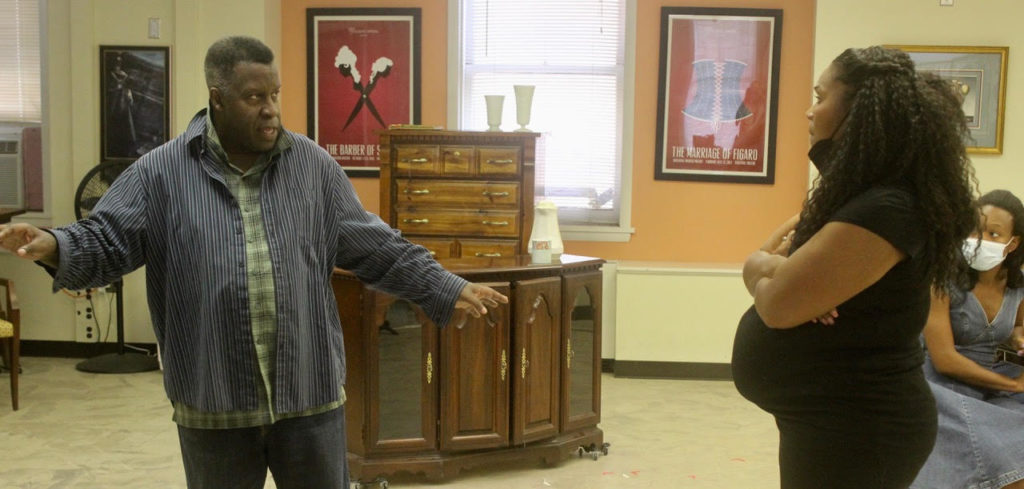
Gillard’s character is not shielded from the realities of a racist society by having a father (Kenneth Kellogg) who is a police officer.
Librettist Thompson, noted theatrical director and playwright, remembers back in 2015 talking with bass-baritone Erik Owens during a production of “Lost in the Stars” at Glimmerglass Opera in Central New York.
As Black men they were discussing “the horror of the killings of these unarmed Black men and boys.”
The news was filled with incident after incident, he recalled. “It horrified me. It scared me. It made me angry. It caused me deep frustration because I didn’t know how to handle it. And as a Black man I’m a moving target.”
About this time, the artistic director of Glimmerglass Francesca Zambello approach the composer Tesori about writing something that reflected the social and political turmoil gripping the country, though not necessarily about race.
Zambello reached out to Thompson for his advice on who should write the libretto for the project. She gave him a list of five names, some of whom he knew. He added another. “What about me?”
Though a playwright, he’d never written the libretto to an opera.
Zambello needed reassurance. Send me something that shows you can write a libretto, she asked.
“Let me do even better than that,” Thompson told her. “There’s something that’s been nagging at me. Give me a couple weeks and I will write a couple scenes.”
He sent it to Zambello who had him contact Tesori. She approved.
That’s how “Blue” was born.
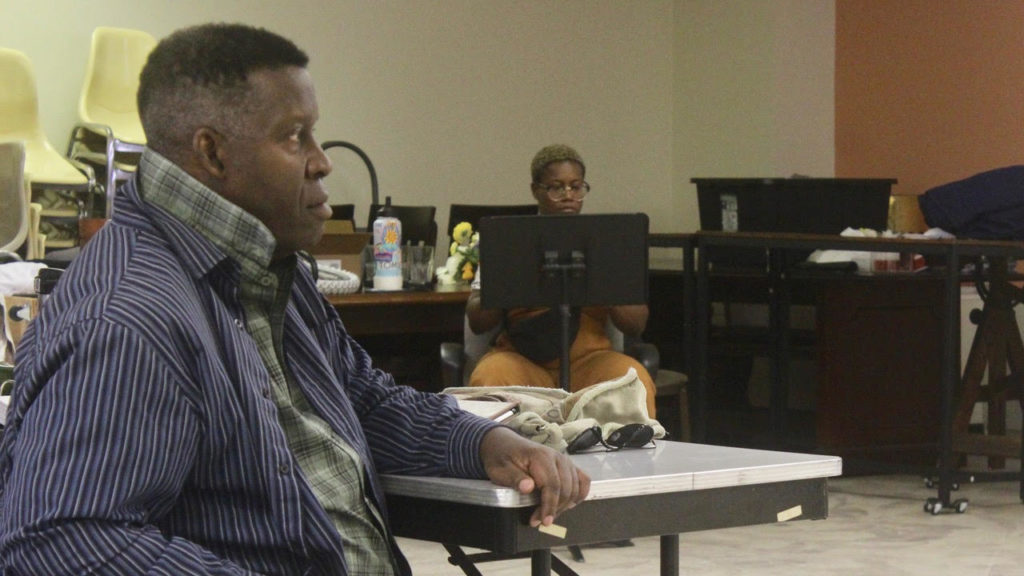
It took Thompson a year to write the libretto. “As I was writing it, there were other incidents.” More families were “ shocked and horrified and saddened and grief stricken” having lost their sons. “Their hopes and dreams and wishes were dashed to pieces.”
From the start, Thompson knew he wanted a stable two-parent nuclear family. The Mother owns a business. Originally The Father was a saxophonist, like Thompson’s own father. It was Tesori who suggested The Father be a police officer.
Thompson wasn’t interested at first but the concept stuck with him. But as he thought more about, it he realized the complexities of having The Father as a police officer and The Son involved in a confrontation with the police.
Much of his draft was tossed out. He rewrote it from that viewpoint.
Thompson did not want the confrontation or the police officer involved to be depicted.
“I wanted this to be an opera about how this tragedy happens and how the community and the friends and the church responds and comforts them and gets them through a certain period of mourning. I wanted it to be a strong community for the mother and father to be in. I think that’s there.”
And for all the darkness, he said, there is humor.
For Gillard, the role of The Son in “Blue” is a welcomed opportunity to portray a person who looks like him. That’s rare aside from “Porgy and Bess.”
“Part of the reason why opera seems so distant from a lot of demographics is we don’t see ourselves,” the tenor said. “It’s important for us to be able to look on stage and see ourselves reflected. I don’t think there’s ever been an opera that covers this subject matter. So, I think to humanize the genre somewhat and make it more accessible.”
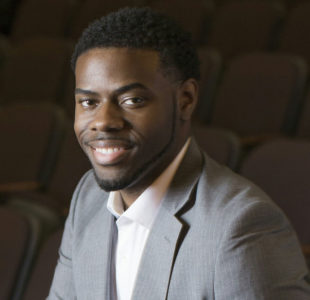
He only discovered opera after he arrived at Claflin University in South Carolina, a few hours from where he grew up.
He was an accounting major – his father insisted on him studying something so he could make money. Then Gillard heard the soprano Lori Hicks.
“I’d never heard a sound like in real life, and we had a conversation about her career and how she did it, and she sort of convinced me that if I wanted I could do it, too.”
Gillard’s only experience was singing in gospel and concert choirs in high school.
“So I changed my major unbeknownst to my parents and never looked back,” he said.
His parents only learned of his switch in direction when he invited them to his senior recital.
“There are a lot of parallels between my character and my everyday life in that the son sort of misses his father at multiple points,” Gillard said.
His relationship with his father has improved, but he still reflects on the difficulties that are specific to being a Black creative born in a Black family.
“Our fathers tend to go the extra mile when it comes to discipline because they don’t want us to fall into these spaces of illegal activities or not making the most of ourselves,” Thompson said. “What we sort of lose is a bit of intimacy. Our fathers think we need to be disciplined, think we need that tough love. But a lot of times, all we need is a little bit of regular love.”
At one point in “Blue,” The Son exclaims: “If you struck me or put your arms around me just once, I’d begin to know that you are human.”
That line always brings him close to tears.
“Though my dad and my relationship has come a long way we didn’t really communicate much when I was young. He had a tendency to just look pass you rather than giving you the intimate fatherly love that you needed rather than just the discipline all the time.”
Thompson said that opera has a way of making a story universal. Having singers soaring over a full orchestra “magnifies the scene,” he said. “It lifts it. It goes straight to the heart.”
“Blue,” which premiered at Glimmerglass in 2019, was originally scheduled for Toledo in January, but because of concerns about the then resurgent pandemic was rescheduled for August.
Toledo Opera has hosted numerous promotional events including a panel discussion with actors and members of the creative team, including conductor Chelsea Tipton. (Click to view the discussion.)
Thompson, who has been in Toledo for about two weeks rehearsing the opera, said the company has kept him very busy.
“For a small company, they are astonishingly on top of marketing and programming. I admire that because when you put all this work in, you don’t want to keep it a secret. You want to get it out to the people, to the community.”

